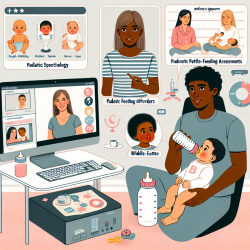Telepractice has emerged as a viable alternative for conducting various clinical assessments, especially in the wake of the COVID-19 pandemic. A recent study titled Evaluating the Use of Telepractice for Bottle-Feeding Assessments sheds light on the reliability and feasibility of conducting bottle-feeding assessments via telepractice. This blog will explore how practitioners can leverage the outcomes of this research to enhance their skills and improve patient outcomes.
Key Findings
The study evaluated the inter-rater reliability of bottle-feeding assessments conducted via synchronous telepractice (real-time videoconferencing) compared to traditional in-person methods. The assessments were performed on 30 children aged 1 month to 2 years, and the results were promising:
- 85% of assessment components met the agreement criteria of ≥80% exact agreement.
- High parent and clinician satisfaction with telepractice sessions.
- Telepractice assessments were feasible for most components, although some intra-oral assessments posed challenges.
Implications for Practitioners
Practitioners can implement several strategies based on the study's findings to enhance their telepractice skills:
- Pre-Appointment Preparation: Encourage parents to send asynchronous images of their child's oral cavity before the appointment. This can improve the reliability of certain assessments, such as palate integrity.
- Use of Technology: Ensure that both the clinician and the family have access to reliable technology. This includes a stable internet connection and properly functioning devices to minimize technical difficulties during the session.
- Assessment Form Utilization: Utilize a purpose-built assessment form that includes all necessary components for a comprehensive evaluation. The study's form covered nine areas, including oral motor skills and overall feeding skills.
- Training and Simulation: Engage in inter-rater reliability training and simulations to achieve high agreement on assessment components. This will help in standardizing the assessment process and improving reliability.
Challenges and Areas for Further Research
While the study demonstrates the potential of telepractice, it also highlights areas that require further research:
- Intra-Oral Assessments: Components like tongue-tie screening and non-nutritive suck assessments were challenging to complete reliably. Future research should focus on developing methods to improve the reliability of these assessments via telepractice.
- Technical Support: Families often faced technical difficulties, such as device battery issues and connectivity problems. Providing technical support and conducting test calls before the appointment can mitigate these issues.
- Diverse Populations: The study's participants were from a specific service area. Future research should explore the applicability of telepractice in diverse cultural and linguistic contexts.
Conclusion
The study provides compelling evidence that telepractice can be a reliable and acceptable method for conducting bottle-feeding assessments. Practitioners can enhance their skills by incorporating the study's findings into their practice. By doing so, they can improve accessibility to essential services and achieve better outcomes for children with pediatric feeding disorders.
To read the original research paper, please follow this link: Evaluating the Use of Telepractice for Bottle-Feeding Assessments.










